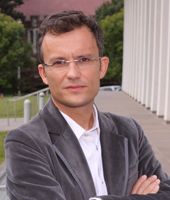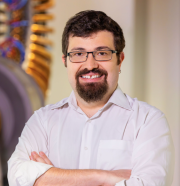June 24, 2025
By the Department of Mechanical and Aerospace Engineering and the Andlinger Center for Energy and the Environment
Effective July 1, five faculty in the Department of Mechanical and Aerospace Engineering have earned promotions. They are:
Michael E. Mueller

Michael E. Mueller, named the Donald R. Dixon ’69 and Elizabeth W. Dixon Professor of Mechanical and Aerospace Engineering, develops advanced computational models to study energy systems and their impact on the environment including combustion in engines and gas turbines, offshore wind farms, atmospheric aerosols and beyond.
These systems involve fluid flows interacting with other physical effects including heat transfer, chemical reactions and electromagnetic fields. Understanding these so-called multi-physics flows informs engineering for aviation engines, stationary gas turbines, wind turbines and emerging energy systems like fusion reactors. Many of the challenges in the combustion systems center around the introduction of new fuels including sustainable aviation fuels (SAF) and carbon-free fuels.
His group also develops algorithms to run these simulations faster and more accurately on modern supercomputers, often combining supercomputing with artificial intelligence to accelerate clean energy research. Many of these activities are in collaboration with the National Renewable Energy Laboratory, where he holds a joint appointment.
Mueller has served as the department’s director of graduate studies and associate chair, and for the next academic year will serve as chair of the department. He is currently Editor of the Proceedings of the Combustion Institute a member of the editorial board of the journal Combustion and Flame.
Mueller joined the Princeton faculty in 2012 after completing both an M.S. and Ph.D. in mechanical engineering at Stanford University, and a B.S. in mechanical engineering from The University of Texas at Austin. He is a fellow of the American Society of Mechanical Engineers, an associate fellow of the American Institute of Aeronautics and Astronautics, and a recipient of multiple awards from the Combustion Institute. He has received the Princeton University Graduate Mentoring Award and the SEAS Distinguished Teacher Award.
Alex Glaser

Alex Glaser, promoted to professor of mechanical and aerospace engineering and public and international affairs, pioneers technical and policy research in nuclear security.
Glaser focuses on reducing the risks associated with nuclear weapons and the materials used to make them. He co-directs Princeton’s Program on Science and Global Security (SGS), which advances technology and policy related to nuclear arms control, nonproliferation and next-generation nuclear energy.
He uses simulation tools to analyze the process by which nuclear fuel is produced, used in reactors and managed as waste to inform policy decisions about nuclear energy. He is also developing methods to reconstruct the history of nuclear material production to ensure that nuclear verification processes can be accurate.
Glaser teaches courses that seek to bridge science, technology and international affairs, including “Satellite Imagery for Policymakers, People, and the Planet” and “Unmaking the Bomb: The Science and Technology of Nuclear Nonproliferation, Disarmament, and Verification,” which combines technical projects with policy analysis.
Glaser joined the Princeton faculty in 2009 with dual appointments in mechanical and aerospace engineering and the School of Public and International Affairs. Before Princeton, Glaser earned a Ph.D. in physics from Darmstadt University of Technology and joined MIT’s Security Studies Program as a research fellow. He is a fellow of the American Physical Society and received the 2025 APS Leo Szilard Lectureship Award. He has been cited by Foreign Policy magazine as one of the world’s 100 Leading Global Thinkers.
Egemen Kolemen

Egemen Kolemen, promoted to professor of mechanical and aerospace engineering and the Andlinger Center for Energy and the Environment, combines engineering and physics approaches to bring fusion energy from research to reality. He also holds an appointment as a staff research physicist at the Princeton Plasma Physics Laboratory (PPPL).
Kolemen’s group is pioneering new plasma control and optimization approaches for stable, high-performance fusion reactions. His lab has leveraged deep reinforcement learning to predict and avoid plasma instabilities in real time during fusion reactions. They have also deployed machine learning tools to maintain high-performing plasma without edge instabilities, which are bursts of energy at the plasma's edge that can damage reactor walls over time.
In another line of research, Kolemen’s team has developed open-source software (DESC) for designing and optimizing stellarators, which are fusion reactors that use external coils and magnets to confine plasma during reactions. The software, which is more accurate and less computationally intensive than existing alternatives, is already in use at several companies seeking to develop commercial fusion reactors.
Kolemen’s group is also exploring the use of liquid metals in the plasma-facing components of fusion reactors, which could serve as a self-healing metal blanket to minimize reactor damage over time.
Kolemen joined the Princeton faculty in 2014. He holds a Ph.D. in mechanical engineering and aerospace engineering from Princeton and a B.S. in mechanical engineering from Boğaziçi University in Istanbul.
Kolemen’s previous honors include a Technical Accomplishment Award from the American Nuclear Society for his research on using machine learning for controlling fusion reactors, as well as the David J. Rose Excellence in Fusion Engineering Award from the Fusion Power Associates for his explorations of liquid metals for fusion reactions. Kolemen is also an ITER Science Fellow.
Aimy Wissa

Aimy Wissa, promoted to associate professor of mechanical and aerospace engineering, develops biologically inspired structures and robotics systems to design more agile, resilient and efficient machines.
Wissa studies how animals and insects – which often have advanced adaptiveness and agility that surpass the most advanced machines and technologies – interact with their surroundings to inspire new engineering designs. Her team uses principles from biology, mechanics and mechanical design to develop robots that can do things like change shape, store and release energy or move across different mediums and terrains.
Wissa’s lab has explored how birds’ feathers contribute to agility during flight, how click beetles launch themselves through the air without using their legs, and how flying fish control how far they glide over waves or skip across the water’s surface. These insights have informed a range of technologies, including a new design for aircraft wings that reduce stall and energy-efficient robots capable of navigating unstructured terrain.
In addition to her research, Wissa developed a class where engineering and biology students work together to design and develop engineering solutions that are inspired by nature.
Wissa joined the Princeton faculty in 2022. She holds a Ph.D. in aerospace engineering and an M.S. in mechanical engineering from the University of Maryland, as well as a B.S. in mechanical engineering from Rensselaer Polytechnic Institute. Wissa has received an Air Force Young Investigator Award, a National Science Foundation CAREER Award, and the Howard B. Wentz, Jr. Junior Faculty Award for excellence in research and teaching.
Jesse Jenkins

Jesse Jenkins, promoted to associate professor of mechanical and aerospace engineering and the Andlinger Center for Energy and the Environment, employs optimization-based methods to inform and evaluate the clean energy transition.
At Princeton, Jenkins leads the ZERO Lab, which uses macro-energy systems models to assess low-carbon energy technologies, guide energy innovation, and provide decision-making support to accelerate the energy transition.
Jenkins’ lab has analyzed the costs and potential adoption of emerging clean technologies including enhanced geothermal systems (EGS) and nuclear fusion. His group has also analyzed the energy system impacts of federal policy, such as the EPA’s recent power plant regulations and the Inflation Reduction Act’s hydrogen production tax credit.
Additionally, Jenkins leads the REPEAT Project, which provides regular, timely, and independent environmental and economic evaluations of federal energy and climate policies as they are proposed and enacted. Recent analyses from the REPEAT Project have highlighted the potential impacts of energy policy rollbacks, such as the repeal of a tax credit for electric vehicles.
Jenkins was also a leader of the highly influential Net-Zero America project, and he has delivered invited testimony to multiple Congressional committees. His work is routinely featured in media outlets including the Wall Street Journal, New York Times, and Washington Post.
Jenkins joined the Princeton faculty in 2019. He holds a Ph.D. in engineering systems and an S.M. in technology and policy from the Massachusetts Institute of Technology, as well as a B.S. in computer and information science and philosophy from the University of Oregon.
Previously, Jenkins was named to the TIME100 Next and TIME100 Climate lists for his work to evaluate and shape the clean energy transition in the United States. At Princeton, he has been recognized with the Howard B. Wentz, Jr. Junior Faculty Award and the Princeton Engineering Research Council Award for Excellence in Teaching. He has received multiple commendations from Princeton’s School of Engineering and Applied Sciences for outstanding teaching.